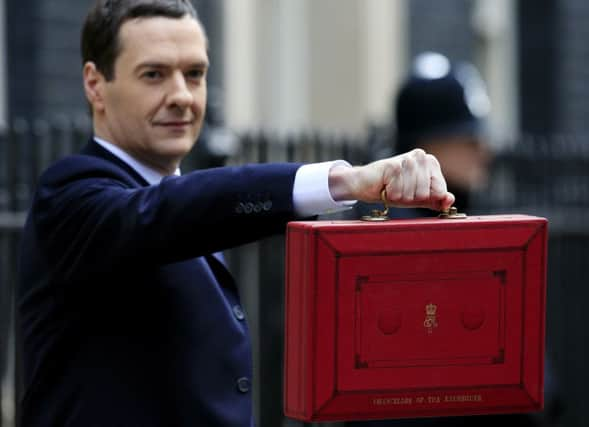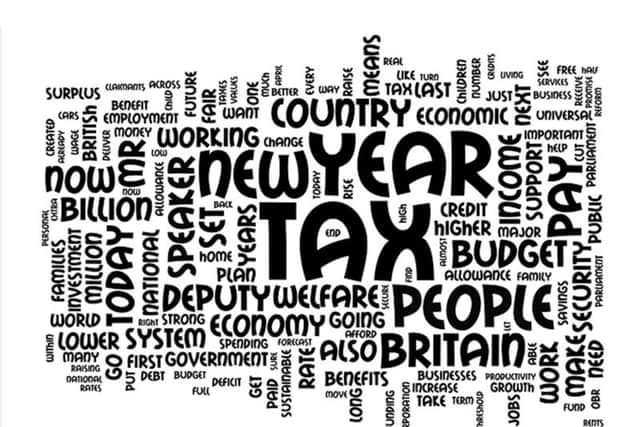Budget 2015: Britain deserves pay rise - Osborne


The measure was the final flourish in the Chancellor’s “security” Budget designed to boost productivity, tackle the deficit and consolidate economic growth.
It means that, from next April, everyone over the age of 25 will be entitled to £7.20 an hour, a figure that will rise to £9 an hour by 2020.
Advertisement
Hide AdAdvertisement
Hide AdThe move will see those currently earning the minimum wage of £6.50 an hour being £5,000 better off by 2020, Mr Osborne claimed, and is expected to affect 140,000 people in Scotland.


The announcement was greeted enthusiastically by Tory MPs, but last night Deputy First Minister John Swinney branded the living wage a “con trick”.
“This Budget is a series of con tricks to try and hide the fact that individual households will now bear the brunt of austerity cuts,” he said.
First Minister Nicola Sturgeon was among critics who highlighted the fact that the new compulsory living wage fell below the existing non-compulsory living wage of £7.85.
Yesterday’s emergency Budget, the first delivered by Mr Osborne without input from the Conservatives’ former coalition partners, the Liberal Democrats, consisted of an audacious package of reforms that amounted to the biggest shake-up in welfare for decades.
Hailing a “higher-wage, lower-tax, lower-welfare” Britain, Mr Osborne announced that the point where people pay income tax will rise next year to £11,000 instead of the planned £10,600 and then to £11,700 in 2017, before rising to £12,500 by 2020.
Meanwhile “a down-payment on the promise” to raise the higher 40p threshold to £50,000 by 2020 will see it rise to £43,000 from £42,385.
Mr Osborne’s £12 billion reduction in welfare spending included a £9bn cut in working tax credits, paid to support people on low incomes, and included an end to paying child tax credit beyond two children. In addition, people under the age of 21 will no longer be automatically entitled to housing benefit, all working-age benefits will be frozen for four years and social rent payments will be cut by 1 per cent every year until 2019.
Advertisement
Hide AdAdvertisement
Hide AdThe Chancellor also reduced the maximum amount of benefits a household can receive to £20,000 – £23,000 in London – and he scrapped student maintenance grants, replacing them with loans which he said would save £1.6bn a year.
Public sector pay increases will be limited to 1 per cent a year for the next four years, he added – a move expected to intensify anger over plans to give MPs a pay rise of 11 per cent.
But Mr Osborne took advantage of a windfall from higher-than-expected tax revenues to slow the pace of welfare reductions, saying the cuts will not be fully implemented until 2019-20, two years later than planned.
Some of the Chancellor’s measures were aimed at the better off, including reform of non-dom status which will mean individuals who currently do not pay tax on their worldwide earnings will start doing so if they have lived in the UK for 15 of the past 20 years.
There was also a package to allow HMRC to pursue tax avoiders, a move expected to bring in an extra £7.34bn.
The Chancellor announced that he will cut corporation tax to 19p, and 18p by the end of the decade, the lowest rate in the G20 group of the world’s largest economies, in a bid to boost economic growth in the UK.
Meanwhile, small businesses will have their National Insurance payments for employees cut by £30,000.
The Chancellor won cheers from his backbenches when he promised that the government will protect military spending and meet Nato’s target of spending 2 per cent of GDP on defence every year to 2020.
Advertisement
Hide AdAdvertisement
Hide AdMr Osborne also found money to deliver the Tory manifesto pledge of increasing NHS funding by £8bn, which will see around £800 million passed on to the Scottish Government.
Addressing the Commons, Mr Osborne described the measures as “a One Nation Budget”.
He told MPs: “The Budget today puts security first. The economic security of a country that lives within its means, the financial security of lower taxes and a new national living wage, the national security of a Britain that defends itself and its values.”
It was, he said, “a plan for working people”.
But last night Labour accused Mr Osborne of “trying to pull the wool over people’s eyes” by rebranding the minimum wage as the living wage, while at the same time slashing benefits for the working poor.
Acting Labour leader Harriet Harman claimed that Budget would make “working people worse off” by cutting support for the low paid.
Labour described the tax credit cuts as a “work penalty” on the low paid, arguing that three million working families will lose a total of £4.5bn.
Labour shadow chancellor Chris Leslie said that many people just above the living wage who would be losing tax credits could be put off work by the changes.
“This isn’t going to bridge across because of the minimum wage change, welcome though the minimum wage change is,” Mr Leslie said.
Advertisement
Hide AdAdvertisement
Hide Ad“The real living wage needs to be a lot higher because of the changes to tax credits.”
Campaign groups and charities warned that the changes could “blow a hole of £1,200” in family incomes.
Susan McPhee, of Citizens Advice Scotland, said that while it welcomes a move towards a living wage economy, “it looks like for most people this will not be enough to offset the impact of the wider cuts”.
The Child Poverty Action Group’s Alison Garnham said: “The suggestion that higher tax allowances will offset tax credit cuts is sheer fallacy: 44 per cent of adults earn too little to pay income tax and those on slightly higher wages gain little because tax credits are withdrawn as incomes rises.”
Barnardo’s chief executive Javed Khan said: “Tax credit cuts could blow a £1,200 hole in some families’ budgets. Promises that this shortfall will be made up for by raising low wages are misleading, because the cuts to tax credits are so severe.”
However, other campaign groups praised the Chancellor.
Julia Unwin, chief executive of the Joseph Rowntree Foundation, said: “The Chancellor is right to focus on building a prosperous UK with higher pay and lower welfare and the role of raising pay and productivity to achieve this.”
Liz Cameron, chief executive of Scottish Chambers of Commerce, said the Budget “shifts the goalposts completely”.
She said: “For businesses, there are pluses and minuses: good news in terms of future further reductions in corporation tax rates, but what will be uppermost in many businesses’ minds is the creation of a new mandatory national living wage and the implications this has for employers.”
ANALYSIS
Advertisement
Hide AdAdvertisement
Hide AdDavid Maddox: Osborne con trick was to make people expect the worst and the cuts look much slighter
AS FAR as con artists go, the double act of Prime Minister David Cameron and Chancellor George Osborne have become masters of duping their opponents. Yesterday’s Budget saw the last play in an elaborate trick which genuinely left MPs on the Opposition benches – both Labour and SNP – gaping in shock unable to know how to respond.
It all began a few weeks ago when Mr Cameron gave a speech effectively appearing to announce the end of working tax credits for the low paid. He said it was a “merry go round” of subsidising low pay. In so doing he allowed everybody to expect the worst, but then like a magician pulling a warrenful of rabbits from a hat Mr Osborne produced something much better – or at least not nearly as catastrophic – for the working poor.
While we expected an assault on working tax credits, Mr Osborne has in effect delayed the ill effects of his cuts and spared many families currently claiming the benefits. For example, families with more than two children on working tax credits will not be affected by the new two-child claimant limit, but families claiming in the future will be. The political principle goes that people miss what they had when it is taken away but nobody misses what they never had.
The biggest rabbit to be pulled from the hat was the increase in the minimum wage, or new living wage, which left Opposition MPs flabbergasted in the face of cheering Tories.
But there were other measures too. It had been expected the reduced benefit cap, down from £26,000 to £23,000, would apply to all the UK. Instead the £23,000 is only for London while the rest of the UK gets £20,000 of welfare per household maximum. By doing that he has spread the load of the cuts although some households will be hurting a great deal.
Here the devolution to Scotland has also provided the Tories with a great deal of help. They know that the SNP are the most vocal and organised opposition and welfare was a big reason many voted Yes in the referendum. But with the Smith Commission proposals going through, they can now say that if Scotland does not like a welfare cap of £20,000 it will be able to bust that cap as long as it finds the money.
The plan to off-load £1 billion of savings on to the BBC with the transfer of responsibility for free licences for over-75s has also been a painless way to save money. If, as many expect, the Corporation eventually ends those free licences, it will also give the Tories an opportunity to partake in one of their favourite blood sports – “BBC bashing”.
Advertisement
Hide AdAdvertisement
Hide AdThere will be unforeseen consequences though. No work appears to have been done on whether people will start having fewer children and how that might affect population growth and the economy.
The UK government has managed to do what many thought was impossible by finding £12bn of savings from welfare, but opponents will say the ultimate con trick is that Mr Osborne has masked cuts to many families’ incomes with a 70p an hour pay rise.